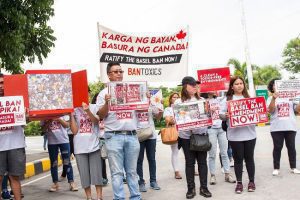In line with the Philippines’ historic repatriation of the Canadian Waste, environmental watchdog group BAN Toxics has urged the Philippine government to expedite its ratification of the Basel Ban or risk becoming the toxic waste dump of the world.

In January 2014, a shipment of garbage from Canada was discovered at the Manila International Container Port, making it the most prominent incident of foreign waste dumping in the Philippines. Since then, environmental organisations have advocated for the return of the garbage.
The incident prompted widespread condemnation of waste disposal from developed nations.
A Philippine court ruled in 2016 that the shipped garbage shall be returned. On May 30, 2019, five years after their discovery in Philippine ports, the Canadian garbage was finally returned to Vancouver. On the same day, BAN Toxics, along with environmental NGO groups, Ecowaste Coalition, Greenpeace Philippines, and Break Free from Plastic, reaffirmed the call to ratify the Basel Ban Amendment, which prohibits the import of all waste for any reason.
In addition to the Canadian waste issue, authorities also uncovered illegally imported hazardous wastes to the Philippines from South Korea, Hong Kong, and Australia in recent years.
The Basel Ban Amendment, adopted by the Basel Convention parties in 1995, prohibits the export of hazardous wastes from member states of the European Union, the Organisation for Economic Cooperation and Development (OECD), and Liechtenstein to poorer countries, whether for recycling or not.
For developing countries like the Philippines that have still not ratified the Ban Amendment, they are inadvertently sending a message that says, “We wish to retain the option of importing hazardous wastes from developed countries, even when the Basel Convention, which we are Party to, has been changed to forbid this type of trade.”
“While this is a momentous moment for the Filipino people, still, the country faces a number of issues related to hazardous waste shipments. As long as there’s nothing that protects the developing countries from becoming a dumping ground for unwanted toxic waste and garbage, we remain vigilant, and will continue to call out the government for immediate actions,” says Reynaldo San Juan Jr., executive director of BAN Toxics.
“We appeal to the Philippine government to ratify the Basel Ban Amendment immediately. Put the responsibility of policing hazardous waste exporters to the country of export, such as Canada, Hong Kong, and Australia. We need to be smart in addressing the problem, and the Basel Ban Amendment is a valuable tool towards protecting a significant portion of the population who are at risk by toxic waste dumping,” San Juan added.
